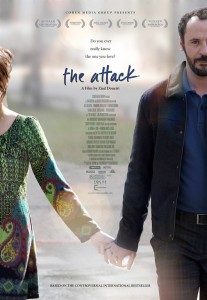 The long-running Israeli-Palestinian conflict serves as the backdrop for the potent Lebanese drama The Attack, which charts the personal journey of a prominent Arab surgeon in the wake of a devastating suicide bombing. Born in the West Bank town of Nablus, Dr. Amin Jaafari (Ali Suliman) has lived and worked in Tel Aviv for years. A self-described “secular Muslim,” he is respected by his Jewish colleagues and has a solid and happy marriage to Siham (Reymonde Amsellem), a Palestinian Christian. As the film opens, Jaafari is preparing to accept the Israeli medical establishment’s highest honor –- the first Arab ever to receive the award. Later that day a suicide bomber blows up a restaurant and horrified hospital personnel work through the night trying to save lives. Amin’s horror turns to shock and disbelief, however, when his wife’s body is found at the blast site –- and investigators insist that she was the bomber.
The long-running Israeli-Palestinian conflict serves as the backdrop for the potent Lebanese drama The Attack, which charts the personal journey of a prominent Arab surgeon in the wake of a devastating suicide bombing. Born in the West Bank town of Nablus, Dr. Amin Jaafari (Ali Suliman) has lived and worked in Tel Aviv for years. A self-described “secular Muslim,” he is respected by his Jewish colleagues and has a solid and happy marriage to Siham (Reymonde Amsellem), a Palestinian Christian. As the film opens, Jaafari is preparing to accept the Israeli medical establishment’s highest honor –- the first Arab ever to receive the award. Later that day a suicide bomber blows up a restaurant and horrified hospital personnel work through the night trying to save lives. Amin’s horror turns to shock and disbelief, however, when his wife’s body is found at the blast site –- and investigators insist that she was the bomber.
Determined to prove Siham’s innocence, Amin tries to trace her activities over her final months. It is a slow process and a painful emotional journey, revealing as much about Amin as about Siham. Haunted by the knowledge she felt she couldn’t confide her changing political outlook to him, he realizes that he had closed his eyes to the very situations that radicalized her. Engulfed by guilt, as well as a sense of betrayal, he is locked inside his own head, existing in a kind of emotional haze. The sense of dislocation and shock is palpable and, thanks to the way the film is designed and shot, the audience is trapped right there with him.
The Attack is admirably balanced, presenting both sides of the conflict. Based on Yasmina Khadra’s 2005, French-language novel of the same title, the screenplay departs from its source material at the end, a decision that makes the film more about Amin’s inner psychological journey than about any political rights and wrongs. By refusing to choose one side over the other — or to condemn Siham and the murderous act she has carried out –- the good doctor loses the trust of both camps and condemns himself to an emotional and political no-man’s land.
Doueiri (West Beirut, Lila Says), who not only directed the picture but also co-wrote the script with his writing partner Joelle Touma, has also placed himself in great danger. Not only does the Lebanese government forbid its citizens from working in Israel (most of the film was shot in and around Tel Aviv), but by presenting Israeli characters in a semi-sympathetic — rather than overtly negative –- light, Doueiri has exposed himself to arrest and prosecution in his homeland. Per order of the Arab League, The Attack will not be released in any Arab country.